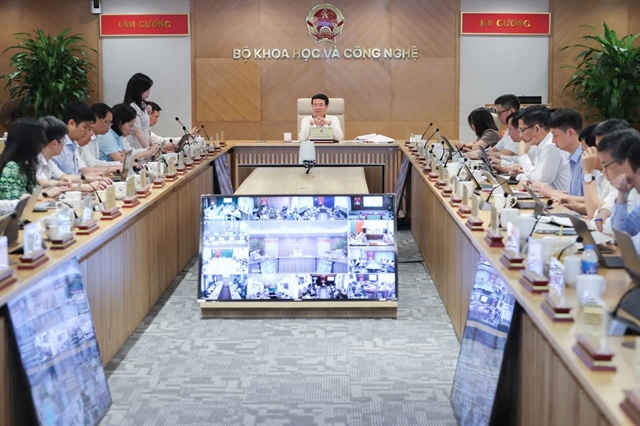Science ministry accelerates formation of tech trading platform, rolls out major Q3 initiatives
The ministry will also submit two resolutions to the Party Central Committee via the Government Party Committee concerning the development of nuclear energy and support for innovation-driven start-ups.

HÀ NỘI — The Ministry of Science and Technology (MoST) will soon approve a proposal to establish a national science and technology trading platform aimed at helping businesses access and apply technological solutions to production. At the same time, it is drafting policies to incentivise domestic enterprises to participate in key projects leveraging science and technology.
The announcement was made during MoST’s second-quarter national online conference on state management held on June 2 with participation from provincial Departments of Science and Technology.
Speaking at the event, Chief of the MoST Office Hoàng Thị Phương Lựu stated that in the third quarter of 2025, the ministry would draft and propose four legislative projects for inclusion in the 2025 law- and ordinance-building programme. These include amendments to the Law on Intellectual Property, the Law on High Technology, the Law on Technology Transfer and a draft Law on National Digital Transformation. These laws are expected to be submitted at the 10th session of the 15th National Assembly.
The ministry will also submit two resolutions to the Party Central Committee via the Government Party Committee concerning the development of nuclear energy and support for innovation-driven start-ups.
Several major proposals will also be submitted to the Prime Minister in Q3, including amendments to Decision 37/2021/QĐ-TTg on the postal network serving State agencies, the establishment of a national environmental radiation monitoring and warning network, the issuance of a national nuclear industry capacity index, a national standardisation strategy through 2030 and a strategy for developing the intellectual workforce in the industrialisation and modernisation era.
The ministry will also continue guiding localities in implementing the 2025 Provincial Innovation Index (PII). MoST has previously issued the PII framework with seven pillars and 52 sub-indicators, of which 13 require direct data from localities. The resulting PII reports will form a basis for provinces and cities to integrate innovation goals into their 2026 socio-economic development plans, in line with the objectives of the Politburo’s Resolution 57-NQ/TW.
According to Lựu, MoST is set to roll out 45 tasks in Q3 related to the implementation of Resolution 57. These include proposing the Government and Prime Minister issue 16 decrees guiding five key laws, a decree on the commissioning mechanism for digital technology firms and eight prime ministerial decisions.
The ministry will also independently issue key criteria for evaluating enterprises' digital transformation, a list of national digital platforms and a roadmap ensuring every citizen has a digital identity, digital skills and a digital account — paving the way for a digitally empowered citizenry.
MoST will work closely with major localities, especially Hà Nội and HCM City, to resolve challenges in developing high-tech zones. In addition, it is coordinating with the Ministry of Education and Training and the Ministry of Home Affairs to address difficulties in implementing the 'three-house' collaboration model between Government, academia and business.
The ministry is also finalising policies for sharing and leveraging science, technology and innovation data, while clarifying roles and responsibilities among ministries, localities and enterprises. By June 10, it will issue guidance on the use of a shared digital platform tailored to the three-tier local government model, enabling local authorities to complete their reviews and assessments within the month. — VNS





